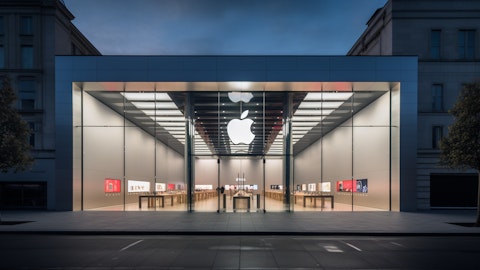We recently published a list of 10 Best Alcohol Stocks To Own According to Hedge Funds. In this article, we are going to take a look at where Diageo plc (NYSE:DEO) stands against the other alcohol stocks.
There is a substantial amount of evidence that suggests that any alcohol consumption, however moderate, can have negative health consequences. Even low levels of drinking can increase the risk of heart disease, high blood pressure, and even certain types of cancer. Understanding that there is no such thing as risk-free drinking, the Centers for Disease Control and Prevention defines moderate drinking as 2 drinks or less per day for men and no more than one drink per day for women. Still, despite the well-publicized health risks, more than two-thirds of adult drinkers regularly exceed those levels.
READ ALSO: 20 Largest Publicly Traded Liquor Companies in the US and 20 Best Wine Brands in the World.
The Global Alcohol Industry:
In 2019, the global alcohol consumption, measured in liters of pure alcohol per person of 15 years of age or older, was 5.5 liters, which is a 4.7% relative decrease from 5.7 liters in 2010. As we mentioned in our article – 20 Countries with the Highest Alcohol Consumption per Capita in 2024 – the global alcoholic beverages market size was valued at $1.62 trillion in 2021 and is projected to reach $2 trillion by 2031, with a CAGR of 2.2% during the forecast period.
The market is likely to be driven by the increasing global young-adult demographic, coupled with high disposable income and consumer demand for premium/super-premium products. Globally, beer drives the market for alcoholic beverages. Regionally, North America and Asia-Pacific are expected to dominate the market during the forecast period.
The American Liquor Market:
The American liquor industry is overcoming economic headwinds to meet changing consumer preferences as it chips away at the dominance of beer. According to the Distilled Spirits Council of the United States, the spirits revenue market share grew from 28.7% in 2000 to 42.1% in 2022, while beer held a 41.9% market share that year. Thus, in 2022, the spirits industry surpassed beer in revenue for the first time ever. The trend continued in 2023 when the spirits market share again totaled more than 42%. The spirits supplier sales in the United States totaled $37.7 billion last year, while volumes rose 1.2% to 308.8 million 9-liter cases.
The rise to the top for spirit-makers is fueled in part by the resurgent cocktail culture, including the growing popularity of ready-to-drink concoctions, as well as strong growth in the tequila and American whiskey segments.
The Financial Impact of Alcohol in America:
As stated in our article – 20 Drunkest States in the US – booze plays an enormous role in the American economy. As of 2021, the total share of the beverage alcohol market in the U.S. represented almost $250 billion and over 3.4 billion cases sold. Beer/FMB/hard seltzer accounted for 43.5% of value share, followed closely by spirits at 39.5%, and wine at a 17% share.
The U.S. alcohol beverage industry is responsible for sustaining more than 4 million jobs and generating almost $70 billion in annual tax revenue. And that doesn’t even scratch the surface of the economic benefits the industry provides to late-night restaurants and pizza shops. According to the Beer Institute, the beer industry alone supports 1.75 million jobs. From the farmers harvesting the barley in your beer, to the beer truck driver, to your local bartender, every aspect of your drink exists because of someone in the alcohol industry working hard behind the scenes.
However, there’s obviously also a downside to the heavy alcohol consumption in America. According to the CDC, excessive drinking costs the country around $249 billion annually, when combining healthcare expenditures, lost earnings and productivity, criminal justice implications, vehicle crashes, property damage, and more. The federal government picks up roughly $100 billion of the tab, largely through Medicare and Medicaid payments. Several evidence-based strategies can help reduce excessive drinking, including increasing alcohol excise taxes, limiting alcohol outlet density, and commercial host liability.
At Insider Monkey we are obsessed with the stocks that hedge funds pile into. The reason is simple: our research has shown that we can outperform the market by imitating the top stock picks of the best hedge funds. Our quarterly newsletter’s strategy selects 14 small-cap and large-cap stocks every quarter and has returned 275% since May 2014, beating its benchmark by 150 percentage points (see more details here).

A close-up of bottles of whisky and other alcoholic beverages from a winery.
Diageo plc (NYSE:DEO)
Number of Hedge Fund Holders: 31
Diageo plc (NYSE:DEO) is a British multinational alcoholic beverage company with its headquarters in London, England. With over 200 brands sold in more than 180 countries, Diageo is the Largest Spirits Company in the World. The company’s portfolio has remarkable breadth across spirits and beer, with brands such as Guinness, Captain Morgan, Johnnie Walker, and Smirnoff etc.
Net sales of the company declined by 1.4% in the fiscal year 2024 ending on the 30th of June, largely due to an unfavorable foreign exchange impact and organic net sales decline, partially offset by hyperinflation adjustments. However, good news came from the highly popular Guinness brand, which gained double-digit volume growth and was the primary driver of overall net beer sales growth of 18%. A major reason for this is that the Irish stout has gained popularity among younger consumers in recent years in part due to celebrity endorsements. Also, despite the challenges, the company generated a strong free cash flow of $2.6 billion in FY 2024, up $0.4 billion from the previous year. Overall, Diageo plc (NYSE:DEO) is still a resilient business, benefitting from its global reach and unrivaled brand portfolio. It is also a Great Alcohol Stock for Dividends, as the company stood up to its reputation as a very reliable dividend payer for decades and increased its full-year dividend by 5%, maintaining its track record of dividend increases since fiscal year 2000.
Artisan Value Fund, an investment management company, stated the following regarding Diageo plc (NYSE:DEO) in its Q4 2023 investor letter:
“Diageo is a global leader in alcoholic beverages with an impressive collection of brands across spirits and beers. The company’s portfolio of over 200 brands provides diversification and allows it to meet consumer trends. A key focus for growth has been premiumization, and today, Diageo’s portfolio is now more heavily weighted toward premium segments. Shares are trading at multiyear trough multiples on fears of growth normalizing after a COVID-induced bounce and premiumization headwinds as some markets are showing consumers trading down to value alternatives. In the near term, margin expansion will likely be constrained, but the company generates meaningful free cash flow and returns it to shareholders through dividends and share repurchases. Over the past five years, Diageo generated £12 billion FCF and returned £16 billion to shareholders. Although spirits are more cyclical than other staples, the company’s growth prospects are better long term, and we believe the current situation has provided us an attractive investment opportunity.”
Overall DEO ranks 6th on our list of the best alcohol stocks to own according to hedge funds. While we acknowledge the potential of DEO as an investment, our conviction lies in the belief that some AI stocks hold great promise for delivering high returns and doing so within a shorter timeframe. If you are looking for an AI stock that is more promising than DEO but that trades at less than 5 times its earnings, check out our report about the cheapest AI stock.
READ NEXT: $30 Trillion Opportunity: 15 Best Humanoid Robot Stocks to Buy According to Morgan Stanley and Jim Cramer Says NVIDIA ‘Has Become A Wasteland’.
Disclosure: None. This article is originally published at Insider Monkey.





